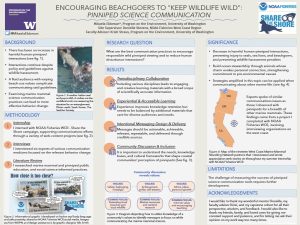Encouraging Beachgoers to Keep Wildlife Wild: Pinniped Science Communication
With an increase in coastal urbanization and pinniped populations, there has been an increase in harmful human interaction with the wildlife that impacts animal survival behaviors, public health, and sentinel research efforts. Communicating responsible wildlife viewing guidelines has not been as successful as needed in this area would benefit from examination. The aim of this study is to identify and amplify the best communication practices to encourage responsible wildlife viewing of pinnipeds. I interned with NOAA Fisheries West Coast Region on the Share the Shore campaign where I learned about communication strategies focused on responsible wildlife viewing guidelines for pinnipeds and other marine mammals, as well as created various web content materials. I also conducted a literature review and interviewed six marine science communication experts specialized in a variety of communication mediums. I found that transdisciplinary collaboration, community inclusion, a balance of accessible and experiential learning opportunities, and intentionally designed and delivered messaging are vital components of successful marine science communication. These practices can spark the most change in the most impactful audiences, promote stronger retention of knowledge, and cultivate a sense of personal ownership in marine issues. These are all important to reducing harmful interactions between beachgoers and pinnipeds and will also build up ocean stewardship in coastal communities on a larger scale. Amplifying these practices in marine science communication will promote human and wildlife health and facilitate better human relationships with marine environments amidst growing conflict over the use of these shared natural spaces.
